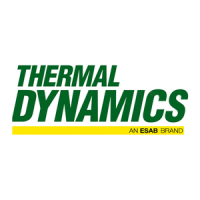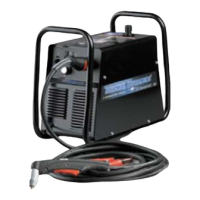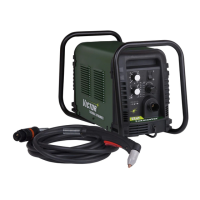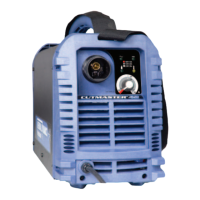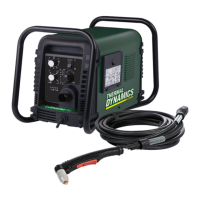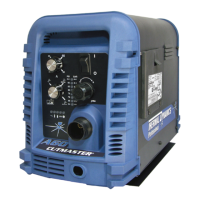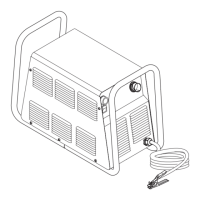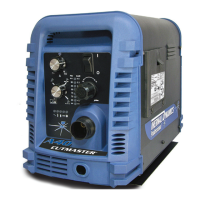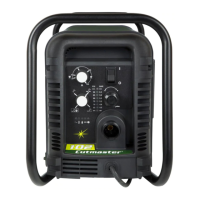Do you have a question about the Thermal Dynamics CUTMASTER 39 and is the answer not in the manual?
Lists key operational capabilities of the plasma cutting system.
Explains the meaning of NOTE, CAUTION, and WARNING annotations used in the manual.
Details critical safety measures for operating plasma arc equipment, including electrical and fume hazards.
Discusses risks associated with noise exposure and plasma arc rays, and protective measures.
Warning about lead content and potential health risks, advising hand washing.
Lists relevant industry standards and publications for further information.
Fields to record purchase details for warranty purposes.
States equipment conformity to applicable directives and regulations.
Outlines product design standards and technical requirements, including flammability and shock hazard compliance.
Details the warranty duration for power supply components and torch/leads.
Lists items not covered by warranty and limitations of liability.
Guide on how to effectively use the operating manual and understand its annotations.
Explains how to locate and record unit identification numbers and serial numbers.
Instructions for inspecting incoming equipment for completeness and shipping damage.
Details input voltage, power sensing, cable, output current, and filtering.
Specifies duty cycle ratings based on ambient temperature and output voltage.
Lists gas type, specifications, input pressure, and flow requirements for the torch.
Provides physical dimensions and weight of the power supply unit.
Specifies required clearance for proper air flow to prevent overheating.
Details input power requirements, fuse sizes, and wire gauges for various voltages.
Lists available optional accessories like air filter kits and carts.
Covers torch configuration, dimensions, lead lengths, cooling, and ratings.
Outlines the purpose of the torch manual and the general design of the plasma torch.
Details torch configurations, lead lengths, parts, cooling, ratings, and current ratings.
Specifies gas requirements for the torch and warns about direct contact hazards.
Explains the principle of plasma gas flow and its role in cutting and gouging.
Details gas distribution within the torch and the function of pilot and main cutting arcs.
Instructions for unpacking, inspecting, and recording equipment details.
Safety guidelines for lifting and moving the power supply unit.
Describes the included power cords and adapter cords for different voltage systems.
Details how to connect the gas supply line to the unit, including sealant recommendations.
Procedure to test the quality of compressed air for contaminants.
Instructions for installing an optional air filter for improved air quality.
Guidelines for connecting and using high-pressure gas cylinders.
Step-by-step guide on how to connect the torch to the power supply unit.
Identifies major external components of the power supply unit.
Explains the function of each control on the power supply panel, including switches and indicators.
Guides on selecting and assembling the correct torch parts for the application.
Instructions for verifying torch connection and primary input power source.
Steps for selecting gas and connecting the work cable to the workpiece.
Procedure for turning the power supply on and checking indicators.
Instructions for setting the correct gas pressure using the RUN/SET switch.
How to set the desired output current level for cutting.
Details the process of cutting, including trigger use and proper technique.
Explains postflow process and steps for safely shutting down the system.
A step-by-step guide outlining the typical sequence for operating the plasma cutting system.
Introduces the SL60/SL100 torch and describes its functional overview.
Initial startup steps and guidance on selecting appropriate torch parts for operations.
Instructions for replacing consumable torch parts like electrodes and tips.
Explains factors affecting cut quality and defines key characteristics like kerf width and bevel angle.
Defines and illustrates various aspects of cut quality, including edge rounding and dross.
Provides general advice on cutting, including safety warnings and handling precautions.
Discusses cutting techniques like piloting, standoff distance, edge starting, and cut direction.
Step-by-step guide for performing standoff cutting with a hand torch.
Instructions for performing drag cutting with the hand torch, including tip selection and technique.
Detailed steps for piercing metal using the hand torch.
Provides a chart of typical cutting speeds for mild steel based on material thickness.
Introduces plasma gouging and discusses key parameters like travel speed and lead angle.
Details the influence of current settings and lead angle on gouging performance.
Outlines a schedule for routine maintenance tasks based on usage frequency.
Guidance on inspecting torch consumables for wear and replacement.
Steps for checking and replacing the internal air filter.
Detailed procedure for replacing the regulator/filter element.
Guidance on lubricating and maintaining the torch's O-ring for proper sealing.
Instructions for checking and replacing the optional single-stage filter element.
Lists common problems and their potential causes for insufficient penetration and arc issues.
Guides on how to isolate defective circuits and identify symptoms.
Steps for initial setup and testing main input and internal power circuits.
Procedures for testing the pilot arc and main arc functionality.
Troubleshooting for blown fuses related to power connection or initial startup.
Diagnosing issues with AC indicator, TEMP indicator, and gas flow.
Troubleshooting PC board faults and gas flow problems.
Diagnosing and resolving issues with no pilot arc or intermittent torch arc.
Addressing pilot arc problems when gas and DC indicators are affected.
Troubleshooting steps when the main cutting arc fails to start.
Essential safety measures to follow before performing system tests.
Instructions for safely opening the power supply unit's cover for access.
Explains how to test diodes using a digital volt/ohmmeter.
Procedure for checking diode bridges for shorts using an ohmmeter.
Precautions for handling PC boards to prevent electrostatic discharge damage.
Step-by-step guide for using an anti-static wrist strap and grounding.
General advice on disassembling and reassembling the power supply for parts replacement.
Reference to section for replacing major external components.
Procedures for replacing parts on the front panel, like knobs and switches.
Details replacement of ON/OFF switch and Run/Set switch.
Reference to section for replacing left side internal parts.
Steps for replacing the pressure gauge on the rear panel.
Instructions for replacing the optional single-stage filter element.
Procedure for replacing the standard filter element in the Regulator/Filter Assembly.
Steps for replacing the pressure switch in the Regulator/Filter Assembly.
Basic maintenance for the torch, including cleaning.
Guidance on lubricating and maintaining the torch's O-ring for proper sealing.
How to inspect and replace torch consumables like tips, electrodes, and cartridges.
Explains the parts list breakdown and the procedure for returning products.
How to order replacement parts using catalog numbers and product details.
Lists common replacement assemblies included with the power supply.
Lists specific replacement parts for the power supply unit.
Identifies major external components available as replacement parts.
Lists replacement parts for the front panel, including switches and knobs.
Lists replacement parts located on the left side of the unit.
Lists replacement parts located on the right side of the unit.
Lists various options and accessories available for the system.
Details the consumable parts for the torch, including part numbers.
Lists parts licensed under specific U.S. Patent Numbers.
A visual block diagram illustrating the operational sequence of the plasma cutting system.
Explains the various symbols and data found on the equipment's data tag.
Diagram showing the layout of components on the main power PC board.
Diagram illustrating the wiring connections for the main PC board.
Diagrams showing the pin configurations for ATC male and female torch connectors.
A comprehensive schematic illustrating the electrical system of the plasma cutter.
Lists contact information for Thermal Dynamics customer service worldwide.
Provides the address and contact details for the corporate headquarters.
| Brand | Thermal Dynamics |
|---|---|
| Model | CUTMASTER 39 |
| Category | Welding System |
| Language | English |
